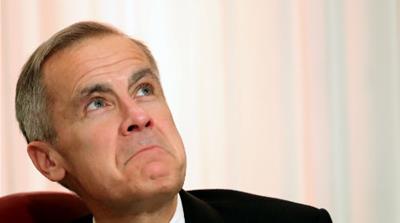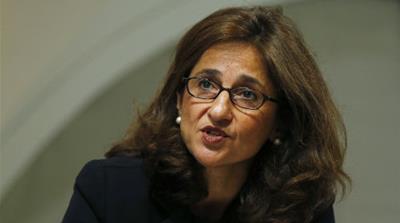What is the IMF, and who will lead it next?
The International Monetary Fund, and the search for the master of politics and finance who will be its next chief.

Imagine the scene: You’re the president of a small country with an economy just about ticking over, when something goes horribly wrong.
Maybe your tourist-dependent island paradise suffers a terrorist attack and thousands cancel their flights. Maybe a neighbouring country invades. Maybe you’ve just made a few mistakes along the way and inadvertently created a bubble which bursts.
Keep reading
list of 4 items‘Mama we’re dying’: Only able to hear her kids in Gaza in their final days
Europe pledges to boost aid to Sudan on unwelcome war anniversary
Birth, death, escape: Three women’s struggle through Sudan’s war
Recession turns to crisis. Your country can’t service its debts and pay its bills. You’re struggling to fix your economic woes and stop a desperate population from rioting – all while keeping the lights on.
What are you going to do? Who are you going to turn to for the short-term cold, hard cash you need?
You need to borrow the world’s credit card.
You need an IMF bailout.
What is the IMF?
The International Monetary Fund was established in the wake of the second world war to help global economic recovery. It now has 189 member nations and a mandate “to foster global monetary cooperation, secure financial stability, facilitate international trade, promote high employment and sustainable economic growth, and reduce poverty around the world”.
But it is best known for providing loans to countries in crisis. And there’s no such thing as free money. There are strings attached – often drastic economic reforms known as “structural adjustment”, demanding the privatisation of public services, deregulation of private industry, and the dropping of trade barriers.
As such, the IMF comes in for a lot of criticism. US economist Jeffrey Sachs famously said its “usual prescription is budgetary belt-tightening – to countries who are much too poor to own belts”.
It also comes under fire from the right, who argue that nations will pursue vote-winning but economically irresponsible policies, knowing the IMF will bail them out if or when it all goes pear-shaped.
And having to lead an organisation like this? Having to carry such responsibility, attempting to put out fires while invoicing for the hosepipe, being both rescuer and disciplinarian, all while facing daily denunciations on all sides? Who would want a job like that?
Well, it turns out, loads of people do.
What makes a good IMF chief?
With Christine Lagarde, the current managing director of the IMF, set to be named the new head of the European Central Bank, speculation as to her replacement is rife.
Chris Hafner is executive director of professional services firm Grovelands and a global strategy expert in leadership.
“Given the current state of global uncertainty and complex international relations, the managing director must be an oasis of calm and pragmatism,” he told Al Jazeera.
Hafner’s colleague Mark Davies, chairman of Grovelands, an expert in international financial services and a former partner at Deloitte, says a sense of vision is key.
“Managing director of the IMF is a big job, a tough job and an important job. [They will need to be] a tremendous communicator both politically and in the media, and able to take a far-sighted view of markets and fiscal policy.”
So who could do it?
Incoming managers must be aged 65 or younger, which rules out 71-year-old Mario Draghi, who is leaving the European Central Bank to make room for Lagarde. Without an IMF rule change, a straight job-swap is unlikely.
Under an informal agreement, the head of the World Bank is always from the United States, while the IMF chief is always a European – part of the post-WWII dealmaking that, while possibly arcane, is still in effect.
“There is no shortage of talented Europeans to run the IMF,” said Augusto Lopez-Claros, a former director the World Bank’s global indicators group.
He named Sweden’s Stefan Ingves and Erkki Liikanen, a Fin.

“I am also sure that Benoit Coeure, a French member of the ECB board, would have strong support,” said Lopez-Claros. “And, of course, it would not surprise me in the least if Jens Weidmann, the head of the Bundesbank, was strongly supported by Germany.”
Weidmann, 51, has been hotly tipped for the IMF job, having lost out on the coveted ECB presidency to Lagarde.
“What might count against him is his being regarded as a dyed-in-the-wool economist, and not a politician,” said Dr Steve McCabe of Birmingham City University.
But the German is “very happy” with his current job and not looking to apply elsewhere, a spokesman told Bloomberg on Thursday.
Brexit Britain seeking spotlight
“There’s no reason to think the next IMF managing director will be a central banker in Europe,” said political scientist Professor Michele Chang, of the College of Europe in Bruges.
“Neither Dominique Strauss-Kahn nor Rodrigo Rato (the two chiefs before Lagarde) were central bankers. The role of central banker tends to be a ‘wonkier’ job, whereas the IMF needs a certain diplomatic capacity.”
Might we, therefore, see another politician being appointed? This is where the UK might cause a surprise. There has never been a British IMF chief, but following Brexit and the rise of populist rhetoric on “this sceptred isle … set in the silver sea”, there is both a perception – and a literal reality – that Brits are turning their backs on multilateral institutions.
“The IMF is a genuinely world-wide organisation,” said Mark Davies of Grovelands. “A UK candidate would help the UK show that we are internationalist in outlook and ready to play our role on the global stage.”
Carney vs Osborne?
But who would the UK nominate? One candidate is obvious. Mark Carney, a Canadian with Irish and British citizenship, has been at the helm of the Bank of England for the past six years, with a reputation as a sensible steady hand on the tiller. He is due to leave the Bank in January.
The other potential candidate making headlines in the UK is a little less obvious, none other than former chancellor George Osborne, now editor of the London Evening Standard. He claims to have support from within both the US and China.
“Mr Carney certainly has the technical expertise, wide experience and credibility to take on the IMF job,” said Lopez-Claros.

“His earlier stints as governor of the Bank of Canada and chairman of the Financial Stability Board would make him an extremely competitive candidate, with an edge over Mr Osborne in terms of relevant experience.”
In fact, Osborne’s political experience may hurt his chances.
“Lagarde was very good on the inequality agenda,” said McCabe. “Whereas Osborne spent years in the UK presiding over a doctrine of austerity – and this may count against him.”
Carney “provides a bridge between the UK, US and Europe”, said Hafner. “He also has the proven temperament having navigated the devaluation of sterling through the Brexit referendum. Osborne, on the other hand, has found his way through political experience rather than economic experience. While a strong personality, I think his chances are slim.”
A break with tradition?
All the talk so far has been of men, and men of a certain hue, taking on the IMF role.

But what about Dame Minouche Shafik, the Egyptian-born British American economist? Surely, with all her accomplishments, she would make a strong contender?
She became the World Bank’s youngest vice president at the age of 36, then permanent secretary of the UK’s Department for International Development, deputy managing director of the IMF and deputy governor of the Bank of England.
“Most names being discussed are male,” said McCabe. “And in a world where we want to be increasing diversity at top levels, this might be one of the considerations.
“It’s a plum job, the Europeans will want to keep hold of it, but this could yet be a break with tradition.”
Beyond Europe
Potential non-European candidates, said McCabe, could include India’s Raghuram Rajan, a former IMF chief economist and current governor of the Reserve Bank of India, or Credit Suisse CEO Tidjane Thiam, of the Ivory Coast. Mohamed El-Erian, the Egyptian American former CEO of investment giant PIMCO, would also be an attractive candidate.
On this last name, Chris Hafner agrees.
“He has the temperament and experience to lead the IMF in these times of global economic uncertainty and volatility,” he told Al Jazeera. “He provides a bridge between the East and the West, his education is unquestionably enviable and he has previous IMF experience. To me, he embodies both inwardly and outwardly what the IMF represents. He is likely the best alternative to a traditional European selection, which may help the IMF avoid being seen as favouring one side of the Brexit debate over the other.”
How about someone from China, truly a global powerhouse? Augusto Lopez-Claros thinks it unlikely, especially as China has held one of the IMF’s number-two spots for a decade.
“I think it is unlikely that the membership is currently ready to give the top IMF job to anyone other than a candidate with relevant experience running some important aspect of a market economy with an open trade system and fully developed financial markets, including a convertible currency and an open capital account,” he said.
It’s an unpredictable world, says McCabe.
“Whoever takes this role over, they face a difficult time in our history,” he said. “Brexit, a trade war, China’s expansionism, growing inequality …
“But when is it not a difficult time?”